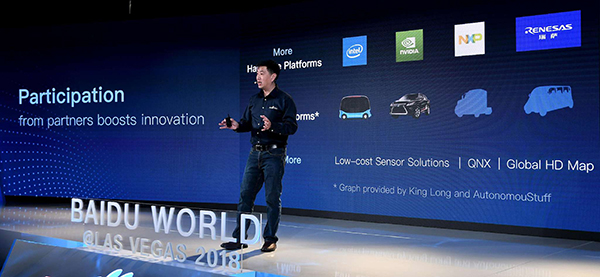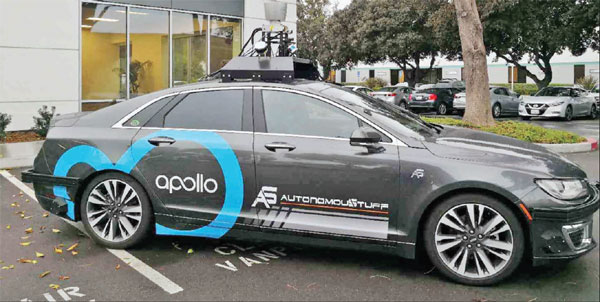Chinese internet giant Baidu Inc announced a big upgrade to its open-source platform "Apollo 2.0" on Jan 9, made to speed up the development and production of autonomous vehicles.
The announcement was released at the company's press conference in Las Vegas, the United States, where the theme was announced as "AI is Changing the World, China Speed".
Wang Jingao, head of Apollo's R&D department, introduced that Apollo 2.0 is able to autopilot on simple urban roads, which means all the four major modules of the Apollo platform, cloud services, software platforms, reference hardware platforms and reference vehicle platforms are in full swing now.
 |
|
Wang Jingao, head of Apollo's R&D department, introduces Apollo 2.0 in Las Vegas on Jan 9. [Photo provided to chinadaily.com.cn] |
Baidu is also working with Access Services, a US-based public paratransit services provider, to launch a self-driving pilot project that will provide short route self-driving vehicle services for persons with disabilities and senior citizen communities.
"Apollo is from China, but is becoming increasingly global and in the future it will cooperate with even more overseas regions," said Zhang Yaqin, president of Baidu.
The company launched the Apollo Global Institute to further promote the growth of global autonomous driving talent by leveraging Baidu's technology centers in Beijing, Shanghai, Shenzhen, Silicon Valley and Seattle.
 |
|
Baidu used the Consumer Electronics Show in Las Vegas to announce an upgrade of its Apollo software. [Photo by Zhang Yang / for China Daily] |
Apollo is expected to fully support all four major computing platforms, NVIDIA, Intel, NXP and Renesas, by 2018.
Chinese technology companies were a strong presence at this year's Consumer Electronics Show in Las Vegas as more than 1,500 companies put their gadgets and innovations in the spotlight.